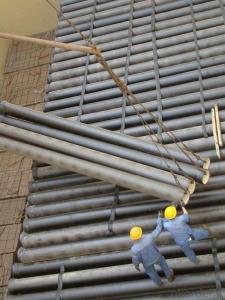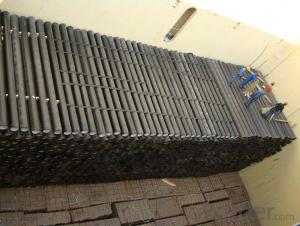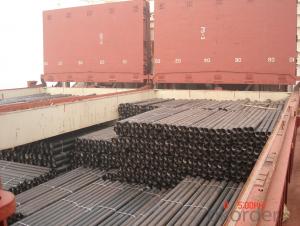DUCTILE IRON PIPE DN300 K8/C/K9
- Loading Port:
- China Main Port
- Payment Terms:
- TT OR LC
- Min Order Qty:
- -
- Supply Capability:
- -
OKorder Service Pledge
OKorder Financial Service
You Might Also Like
Specification:
1) The standard of pipe: ISO2531:1998, K9
2) Effective length: 6m
3) Inner cement line: Portland cement line as per ISO4179
4) Zinc coating: at least 130g/m2 as per ISO8179
5) Bitumen painting: at least 70um as per ISO8179
6) With 100% quantity of NBR ring, or SBR ring, or EPDM ring as per ISO4633
7) DN80mm-800mm
8) High strength, lighter than grey iron, good corrosion resistance, no furring, small flow resistance, easy fixing, long life tome about 100 yeas
9) Produced by Hangzhou chunfeng machine
10) Checked by automatic inspection equipment
11) Composition:
Chemical composition | | | | |||
Chemical composition | Ductile Cast Iron Pipe (%) | Grey iron pipe (%) | Steel pipe (%) | | | |
C | 3.5-4.0 | 3.2-3.8 | 0.1-0.2 | | | |
Si | 1.9-2.6 | 1.4-2.2 | 0.15-0.4 | | | |
Mn | 0.15-0.45 | 0.4-0.6 | 0.3-0.6 | | | |
P | ≤0.06 | ≤0.3 | 0.02-0.03 | | | |
S | ≤0.02 | ≤0.1 | 0.02-0.03 | | | |
Mg | 0.03-0.06 |
|
| | | |
12) Feature:
Mechanical properties | | | | |||
| Ductile Cast Iron Pipe | Grey Iron Pipe | Steel Pipe | | | |
Tensile Strength(Mpa) | ≥420 | 150-260 | ≥400 | | | |
Yield Strength(Mpa) | ≥300 | No Confirmation | No Confirmation | | | |
Bending Strength(Mpa) | ≥590 | 200-360 | ≥400 | | | |
Elongation (%) | ≥10 | Neglected | ≥18 | | | |
Brinell Hardness(HBS) | ≤230 | ≤230 | About 140 | | | |
13) T type mechanical joint
14) Packing: in bulk or container
- Q:Are ductile iron pipes suitable for use in saltwater environments?
- Ductile iron pipes are generally not considered suitable for use in saltwater environments due to their susceptibility to corrosion. Saltwater is highly corrosive and can accelerate the degradation of ductile iron pipes. While ductile iron pipes offer good strength and durability, they have a higher likelihood of corroding in saltwater compared to other materials like stainless steel or corrosion-resistant alloys. Therefore, it is recommended to use materials specifically designed for saltwater environments to ensure long-term functionality and avoid costly repairs or replacements.
- Q:How does ductile iron pipe handle ground movement and settlement?
- Ductile iron pipe is known for its excellent ability to handle ground movement and settlement. Due to its inherent strength and flexibility, it can withstand significant ground shifts without experiencing major damage or failure. One of the key features of ductile iron pipe is its high tensile strength, which allows it to withstand external forces and pressures. This strength enables the pipe to resist the effects of ground movement, such as soil settlement, subsidence, or shifting due to seismic activity. Moreover, ductile iron pipe has inherent flexibility, which allows it to absorb and distribute stress caused by ground movement. The pipe's flexibility helps to minimize the impact of settlement by allowing it to adjust and adapt to changes in the surrounding soil. This characteristic helps prevent the pipe from cracking, breaking, or leaking when the ground shifts or settles. Additionally, ductile iron pipes are often installed with flexible joints, such as push-on or mechanical joints, which further enhance their ability to accommodate ground movement. These joints provide a degree of flexibility and movement, allowing the pipe to adjust to changes in the soil without experiencing stress concentrations or structural failure. Furthermore, ductile iron pipe is highly resistant to corrosion, which is another important factor in its ability to handle ground movement and settlement. Corrosion can weaken pipes and make them more susceptible to damage during ground shifts. However, the corrosion-resistant properties of ductile iron help maintain the pipe's structural integrity and durability, even in challenging soil conditions. In summary, ductile iron pipe is well-suited to handle ground movement and settlement due to its high tensile strength, flexibility, and corrosion resistance. These properties allow the pipe to withstand external forces and adapt to changes in the surrounding soil, minimizing the risk of damage, leaks, or failure.
- Q:Can ductile iron pipes be used for offshore oil and gas installations?
- Yes, ductile iron pipes can be used for offshore oil and gas installations. Ductile iron is known for its strength, durability, and corrosion resistance, making it suitable for various applications including offshore environments. Additionally, ductile iron pipes are cost-effective and can withstand high pressure and extreme weather conditions, making them a reliable choice for offshore oil and gas installations.
- Q:How many degrees can the ductile iron pipe be each?
- Although ductile iron has a certain plasticity, it should not be bent in use
- Q:What is the average diameter range of ductile iron pipes?
- The diameter of ductile iron pipes can vary depending on the application and industry standards. In general, there is a wide range of diameters available to meet different requirements. Ductile iron pipes can start from as small as 4 inches (100 mm) and go up to 64 inches (1600 mm) or even larger. These sizes are commonly used for water distribution, sewer systems, and infrastructure projects. It is important to consider factors such as local regulations, project specifications, and engineering considerations when determining the appropriate diameter range. Consult industry standards and relevant authorities for specific applications.
- Q:Do rigid cement cast iron pipes need cement piers?
- Ductile iron pipes mainly called centrifugal ductile iron pipe, it has the properties of nature, iron and steel, excellent corrosion resistance, good ductility, good sealing effect, simple installation, mainly for municipal, industrial and mining enterprises, water supply, gas, oil etc.. Water supply pipe is the first choice, with high cost performance. Compared with the PE pipe, from the installation time, ductile pipe PE pipe installation is simple and rapid, and after the installation of internal and external pressure bearing better tightness and corrosion resistance; from the point of view, ductile pipe sealing better after installation, but also can improve the corrosion resistance of corrosion protection through a variety of means; from the hydraulic performance, because ductile pipe specifications generally refers to the inner diameter of PE pipe diameter specifications generally refers to the same specifications, because under the condition of ductile pipe can achieve greater runoff; from the installation and maintenance cost, ductile pipe have more favorable price. The main components of ductile iron pipes are carbon, silicon, manganese, sulfur, phosphorus and magnesium. The inner wall of zinc spray, anti-corrosion materials such as cement mortar.
- Q:Are ductile iron pipes suitable for sewage treatment plants?
- Yes, ductile iron pipes are suitable for sewage treatment plants. Ductile iron pipes are known for their durability, strength, and corrosion resistance, making them ideal for handling the corrosive and abrasive nature of sewage. They can withstand high pressure and are capable of accommodating heavy loads and ground movements, making them a reliable choice for sewage treatment facilities. Additionally, their smooth interior surface minimizes friction, reducing the risk of clogs and improving the flow of wastewater.
- Q:What are the different corrosion protection options for ductile iron pipe?
- To ensure the longevity and durability of ductile iron pipes, there are several options available for corrosion protection. These options are as follows: 1. Cement Mortar Lining: A layer of cement mortar is applied to the inner surface of the pipe, creating a barrier against corrosive elements in water or soil. This lining offers excellent corrosion resistance and can endure for many decades. 2. Polyethylene Encasement: The ductile iron pipe is wrapped with a layer of polyethylene material, which acts as a physical shield against external corrosive elements. This method is commonly employed in aggressive soil conditions and provides long-lasting protection. 3. Internal and External Coatings: Different types of coatings, such as epoxy, polyurethane, or fusion-bonded epoxy (FBE) coatings, can be applied to the inner and outer surfaces of the pipe to resist corrosion. These coatings form a barrier that prevents the pipe from corroding in the surrounding environment. 4. Cathodic Protection: An electrical current is utilized to safeguard the pipe from corrosion. Cathodic protection systems can be either galvanic (sacrificial anode) or impressed current systems. These systems control the flow of electrons, preventing the oxidation of the ductile iron pipe. 5. Zinc Coating: Also known as galvanizing, this method involves applying a layer of zinc to the surface of the ductile iron pipe. Zinc acts as a sacrificial anode, corroding instead of the iron pipe. Zinc coating is particularly effective in soil conditions with low resistivity, offering reliable corrosion protection. It is crucial to consider various factors such as the environment, water chemistry, soil conditions, and expected service life when choosing a corrosion protection option for ductile iron pipes. Consulting with corrosion protection specialists and engineers can assist in selecting the most suitable option for specific applications.
- Q:How do ductile iron pipes perform in high-altitude areas?
- Due to their inherent strength and durability, ductile iron pipes are highly effective in high-altitude regions. The exceptional properties of ductile iron, such as its high tensile strength and impact resistance, make it ideal for withstanding the challenges presented by high-altitude environments. One significant advantage of ductile iron pipes is their ability to endure both internal and external pressures. In areas with varying water pressure, these pipes can withstand such fluctuations without compromising their structural integrity. This guarantees a consistent and uninterrupted flow of water, eliminating the risk of pipe failures or leaks. Furthermore, ductile iron pipes possess excellent resistance against corrosion, which is crucial in high-altitude areas with unpredictable and harsh atmospheric conditions. The protective lining and external coatings of these pipes provide an additional layer of defense, ensuring their durability and reducing the need for frequent maintenance or replacements. Additionally, ductile iron pipes have a higher tolerance for temperature variations compared to other materials. In high-altitude regions where temperature fluctuations can be extreme, these pipes can withstand expansion and contraction without cracking or rupturing. This thermal stability is vital for maintaining the integrity of the pipeline system and preventing costly repairs. To summarize, ductile iron pipes are an ideal choice for high-altitude areas due to their strength, durability, resistance to pressure variations, corrosion resistance, and thermal stability. These properties make them a reliable option for water distribution systems in such environments, ensuring a continuous water supply without compromising safety or efficiency.
- Q:What is the difference between a cast iron pipe and a ductile iron pipe?
- The ball compressive strength of ductile iron pipe is much higher than that of cast iron pipes, buried in the ground, the car is not easy to be crushed.
1. Manufacturer Overview |
|
|---|---|
| Location | |
| Year Established | |
| Annual Output Value | |
| Main Markets | |
| Company Certifications | |
2. Manufacturer Certificates |
|
|---|---|
| a) Certification Name | |
| Range | |
| Reference | |
| Validity Period | |
3. Manufacturer Capability |
|
|---|---|
| a)Trade Capacity | |
| Nearest Port | |
| Export Percentage | |
| No.of Employees in Trade Department | |
| Language Spoken: | |
| b)Factory Information | |
| Factory Size: | |
| No. of Production Lines | |
| Contract Manufacturing | |
| Product Price Range | |
Send your message to us
DUCTILE IRON PIPE DN300 K8/C/K9
- Loading Port:
- China Main Port
- Payment Terms:
- TT OR LC
- Min Order Qty:
- -
- Supply Capability:
- -
OKorder Service Pledge
OKorder Financial Service
Similar products
New products
Hot products
Related keywords



























